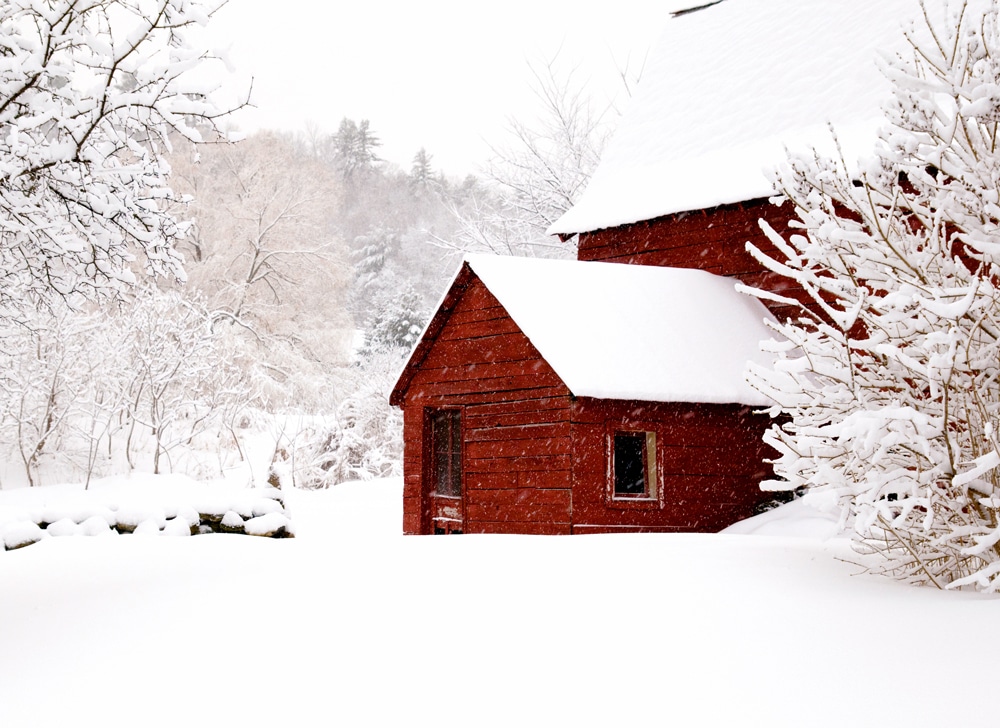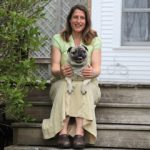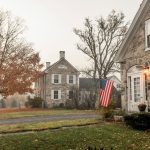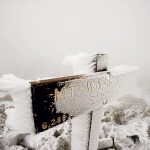Animal Instincts | The Farmer’s Life: Dispatches from Chickadee Farm in Craftsbury, Vermont
When you own livestock, a part of you is always with them no matter where you go. Especially in winter.

Coffee By Design | Portland, Maine
Photo Credit : Katherine KeenanBillowing snow erased the world — there was no delineation between land and lane, so I drove the road from memory. I was hurrying home as fast as I could, traveling the sinuous six miles to my little homestead from the nearby college where I taught. I was worried about the cows. The 2007 Valentine’s Day Blizzard was delivering inches by the hour, and the temperature had dropped to zero. I knew the rising snow would ground out my corral’s fencer, and gale winds would fill the open barn with drifts.

When you have an animal — say, a bred heifer, a bunch of sheep, or a flock of chickens — part of you persists with them, no matter where you go. One tiny precinct of your brain is always outdoors, alert to their perpetual vulnerability to coyotes and foxes and owls and hailstones and plunging temperatures and lightning. I think of it as my invisible antennae, this part of me that’s trying to intuit their wellbeing. My subliminal farm-animal monitor is constantly wondering: Do they have enough water? Do they have enough hay? Pasture? Shade? Is the fencer on?
Once when I was hurtling down the interstate on my way to southern New Hampshire, I realized I’d forgotten to turn on the fencer. Already an hour away from home, I had the sickening feeling there was no electrical current to dissuade my cow and sheep from exploring other lush pastures or — a disconcerting thought — the road. I didn’t own a cellphone; back then, hardly anybody did. The reality sobered me. Should I quit the day, turn around, and drive back to plug it in? I didn’t want to turn back. I mentally laid a cinder block in my mischievous cow’s gut and gave her lead hooves. And I prayed for an uneventful day. (Thankfully, it was.)
There’s nothing so heart-hollowing as getting the call saying, “Your animal is out.” On another occasion, I was five hours from home, in northern Maine, at a sizable conference when the director suddenly interrupted the presenter at the podium. He looked out into the audience and said, “I have an important announcement … for Julia? We’ve just received a call, and your sheep are in the road.”
Even when I am home and I know the fencer’s on full force and the weather’s amiable, I might still wake to urgent baas or the shrieking of hens, and skitter out of bed to discover the a ram with his head stuck in the water bucket or a weasel clamped to the rooster’s throat.
Yet in the Valentine’s Day rush to tend my blizzard-bound animals, I risked my own safety. Misjudging where the road curved, I drove into a snowbank and was stuck fast, like a ship gone aground. Dressed in flimsy teaching clothes — a coat thrown over my blouse, skirt, tights, and dress shoes — I staggered into the breathtaking cold to pound on a nearby farmhouse door. A silver-haired woman answered, greeting me with “You shouldn’t be out in this weather!” Then she called up her strapping son to come tug my car free.
By the time I made it home, the snowdrifts between the house and barn were hip-high, but fluffy. My passage to the barn, which is usually an easy stroll, became something akin to wading into deep water. Using my body as a plow, I tunneled out to my animals. I found them huddled in the barn, their backs to the swirling wind. The neighbor’s scolding voice echoed in my head: Nobody goes out in this weather!
I closed the door and opened a fresh bale of hay for the animals. Between the fragrance of the dry timothy and the heat radiating from the cows — their internal temperature is 101 degrees — we’d achieved a modicum of summer within the raging snowstorm.
After securing them in the barn, I crawled back toward the house to check on the propane vent. This little periscope-shaped tube juts out at the base of the house and is sometimes smothered when the roof sheds its accumulated burdens. I had just excavated it when I looked up and saw the replenished roof’s immense freight looming above me. If it had avalanched, I might have been entombed just inches from my cozy living room. And then, who would find me? And when? I’d be remembered as the unintentional snow-woman — my partial attention to the elements having become total.
A few years after that blizzard, I met my husband. Every winter, he erects a crowd of snowmen on our lawn. He gives them broad bodies and expressive faces, using twigs to define their features and broken branches for their arms. Afterward, we watch how these snow creatures — these effigies for the part of us that remains outside — fare, waxing and waning in the changing weather.
Then, in the late spring, when the hazards of winter have vanished, and the cows eye the thickening pasture and the hens drift where the banks were, I’ll gather up the season’s detritus — sticks like fallen antennae, shucked antlers — all that’s left of the snowman’s open arms and his simple smile.
Julia Shipley is the author of three poetry chapbooks and most recently a prose collection, Adam’s Mark: Writing from the Ox House, supported by a 2010-2011 Vermont Arts Council Creation Grant and published by Plowboy Press.








